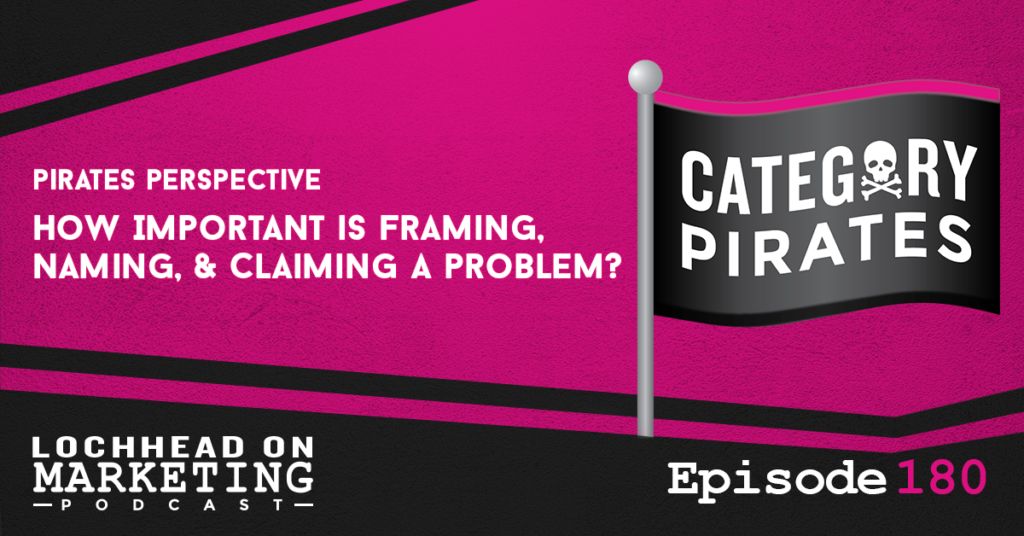180 How Important is Framing, Naming, & Claiming a Problem? | Pirates Perspective

Podcast (lochheadonmarketing): Play in new window | Download (Duration: 11:13 — 7.7MB) | Embed
Subscribe: Apple Podcasts | Spotify | RSS | More
On this episode, we are presenting some Pirates Perspective from our newsletter, Category Pirates.
Eddie Yoon, Christopher Lochhead and Katrina Kirsch of Category Pirates discuss why it’s crucial to frame, name, and claim a problem when designing a category and marketing it to customers. They also discuss why companies struggle to articulate their problems, and explain what happens if they fail to properly language it.
Welcome to Lochhead on Marketing. The number one charting marketing podcast for marketers, category designers, and entrepreneurs with a different mind.
The three most important things a company does at the highest levels
When asked about the problem that category design solves, Christopher emphasizes three key aspects. Firstly, it is important to believe that there are three crucial elements for a successful company: designing a legendary company/business model, offering legendary products/services, and creating a legendary category. These three aspects are considered the most important things a company does. If someone does not agree with this belief, he thinks that there is no basis for further discussion.
Secondly, it is necessary to acknowledge the significance of taking ownership and authorship of the category. If someone is willing to assume this responsibility, then assistance can be provided. However, if they are not interested in this aspect, there is no intention to convince or persuade them.
“That’s the difference between you walking in the dojo and us standing outside the dojo and dragging you into it.”
– Christopher Lochhead
Would you rather capture the 76% or compete for the 24%?
Eddie Yoon emphasizes the importance of category design in capturing the market. He argues that if one does not recognize the significance of category design, then other considerations become irrelevant. If it is agreed that category design is important, it must be acknowledged that it should be pursued wholeheartedly.
Eddie suggests that the question of why naming, framing, and claiming are important is essentially a question about the importance of category design itself. He states that if one does not understand the essence of category design, they cannot effectively address the first question.
He presents a scenario where capturing 76% of the category economics is compared to competing for the remaining 24% with a better or faster, cheaper version. Eddie suggests that many people are actually comfortable with the smaller percentage because it is familiar and known. However, if someone is content with competing for the smaller share, Eddie acknowledges their choice and states that traditional business strategies and teachings will suffice for that situation.
Ultimately, Eddie highlights the importance of understanding one’s preference for a larger or smaller market share and reframing the perspective accordingly.
Unlearning the 24% way
Eddie Yoon discusses the necessity of unlearning old and “comfortable” ways in order to capture the 76% of the market. He emphasizes that choosing to pursue the larger market share requires a significant amount of unlearning.
Part of this unlearning process involves freeing oneself to focus on understanding and articulating the problem at hand. Eddie compares it to Mark Twain’s quote about not having time to write a short letter, which highlights the importance of concise and effective communication. Framing, naming, and claiming the problem are essential because without the ability to express it clearly, important details can be lost in subsequent conversations with coworkers, investors, or customers. This loss of clarity can lead to a diluted understanding of the value proposition.
Eddie explains that without a clear understanding of the problem and its articulation, customers may not perceive the worth or premium of the product or service, investors may question the multiple premiums, and employees may not see the value of choosing the company over competitors focusing on the smaller market share.
Don’t forget to grab a copy (or gift!) of one of our best-selling books:
Snow Leopard: How Legendary Writers Create A Category Of One
The Category Design Toolkit: Beyond Marketing: 15 Frameworks For Creating & Dominating Your Niche
A Marketer’s Guide To Category Design: How To Escape The “Better” Trap, Dam The Demand, And Launch A Lightning Strike Strategy
We hope you enjoyed this episode of Lochhead on Marketing™! Christopher loves hearing from his listeners. Feel free to email him, connect on Facebook, Twitter, Instagram, and subscribe on iTunes!

